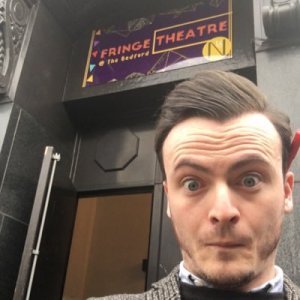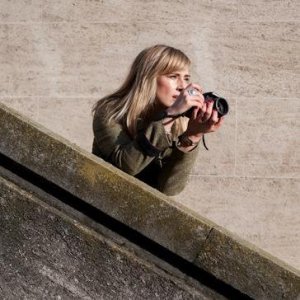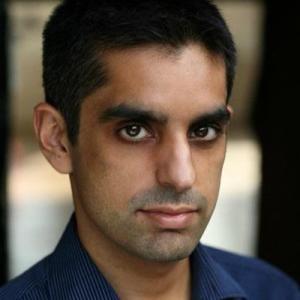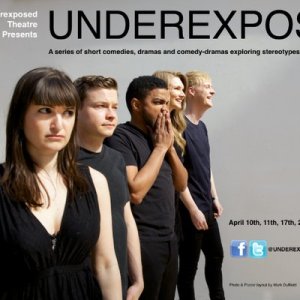
Jaime is a producer, performer, artistic director and executive director of Theatre N16 in Balham. The theatre has moved from Stoke Newington and is becoming a prominent fringe venue for new writing and quality work. Jaime has worked hard and knows the industry well having produced many plays at Edinburgh, as well as up North, he also understands the struggles actors face as he was one once himself. Theatre N16 is a fringe venue that has just signed with Equity @EquityLPNP and in the last 6 months and has paid all his staff a wage, that’s a really positive step forward for fringe theatre. Here Jaime answers my questions.

Jamie growing up how did you decide that you wanted to be an actor?
I always knew I was an entertainer, I needed a medium to express myself from a young age and that’s how acting came about. I would however say now I definitely don’t consider myself as an actor and I’ve gave that side up. As a producer and artistic director I see myself as a storyteller now.
Who inspires you?
So many things and people inspire me. My real love is football and where I’m from, that always inspires me. I’m from the North East where passion comes in abundance. Heart on your sleeve types are the norm. That’s definitely what inspires me most. I just want to tell stories with real fight and against the norm. The individual that inspires me most at the minute would be Michael Harrison who’s one of the producers of Gypsy and The Bodyguard on the West End. We have ties to the same small town theatre where I’m from so to know somebody from home has done so well makes me know I can do the same.
What attracts you to theatre especially ?
I found it the easiest medium to get into so that’s what sort of hooked me. I have a background in filmmaking also, but with filmmaking it always takes meticulous planning and an excessive amount of time micromanaging. With theatre I’ve always had a knack of getting shit done with no money and just real graft so that’s the attraction really. I think i’d be making films if I had loads of cash. Probably because I enjoy watching films more than watching theatre If I’m honest.
What advise as an actor would you give to other actors
As a theatre maker I’d advise to mingle lots. Don’t ‘Network’ that words a load of shite, just mingle and see things and do things and meet people and just be nice and not businesey and just nice. Does that make sense? I cast someone on 1/3 talent, 1/3 suiting the part and 1/3 a nice human being who wants to talk about lots of nice things. And is nice. Also work hard, work damn hard. Nobody owes you anything, yes we all complain sometimes about how “difficult it is to break in to the industry” but stay grounded and remember you live in the UK, you’ve most likely got food on your table and your chasing a dream
You have produced many of your own plays at the fringe, how has this developed you as a producer, artist?
I started as a producer on the fringe to basically give myself parts and help people around me so as a producer it helped massively. The best thing is to make a load of mistakes and learn in the worst possible situation. I’ve learned so much from these mistakes and seeing mistakes and how not to do things around me.
What advise do you give companies going to the fringe?
If it’s your first time? I’d say don’t listen to what most people say. Most people will say don’t get pissed and whatnot. I’d say do it, drink every night, go to parties, meet loads of people, see loads of stuff. Chances are you’re not gonna get picked up in your first year, so just really be in the moment and enjoy it. Your part of the biggest arts festival in the world. It’s such a special feeling. Especially the first time you do it, it’s electric. And you just never know who you’re going to speak to a 4 in the morning after your eleventh cinzano and lemonade.
You have a theatre company based at The Bedford in Balham, what made you set up Theatre N16? What is N16 ethos?
I’ve always talked about having a pub theatre for years. I worked for a golf club for years and used to produce theatre in it’s clubhouse so I’ve always known the restrictions and the skillset you need to manage a building that might not necessarily ‘get’ theatre. I worked for another theatre on their management team for a year and decided I’d picked up enough skills and ideas and could do it myself, so that’s where N16 came about. Myself and a few other creatives opened it up for a short time in Stoke Newington (where the N16 comes from) and the idea was to provide a space that kept overheads as low as possible and that’s basically what it’s about. We believe in everyone being paid fairly, all of our staff are paid, we don’t run on volunteers like other places and we signed Equity’s fringe agreement too recently. Again reiterating what I said before, I’ve always had a knack of finding money and making work through hard work. N16 is an accumulation of that.
You promote allot of new writing, what about new writing excites you?
I like text and you just know when you read something that could be brilliant. As a producer on the hunt for the next big thing is an exciting prospect. I want to find the next Luke Barnes or Alistair Mcdowell. (Both Northern lads may I add)
You just signed a agreement with payment for fringe artists , kudos, what other issues do you think are most prevalent in the industry at the moment?
Issues is a tough word isn’t it. I think there’s many problems in the industry at the minute that lots of people are working extremely hard to solve, gender equality being a massive one but that’s obviously not just this industry. If anything I’d say our industry is at the forefront of trying to change things with loud voices speaking out and doing so much to make a difference.
You have been supporting Actor Awareness, firstly thank you and secondly why do you think it is important to offer your support? How do you feel about diversity especially working class actors?
I’m from a real working class area and it’s blindingly obvious that the people currently in power don’t give a flying fuck about any of us plebians. I think pushing working class people and trying to get them on a level playing field is something that has to be done. Diversity across all platforms of storytelling is a must for proper balanced work to breakout. I’m a massive fighter for this idea and will continue to be so. However sometimes if you just step back, see what you are trying to do, realise you’re white, male, live in the UK and look at what’s happening all over the world- it makes you push a little harder and continuously appreciate what you have, over what you don’t have.
Thank you Jaime for your time.
Readers DO go visit Theatre N16, they have fab new writing and plays being produced as well a literacy department for budding writers, where you can get feedback on your play. Jaime is the very essence of Actor Awareness, a northern working class lad pushing for a diverse theatre forefront.
















